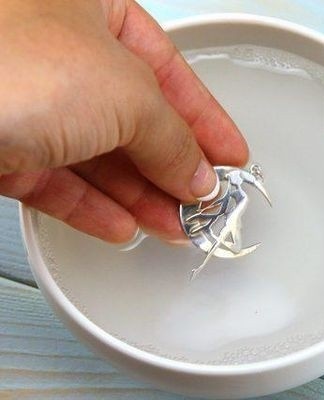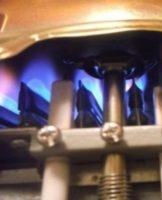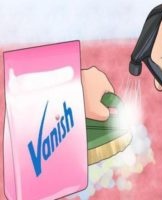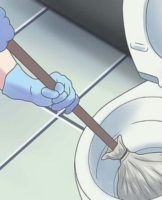23 Best Home Remedies to Clean Table Silver
In many homes, you can still find valuable inherited sets or simply serve as an exquisite decorative element at a festive feast. However, noble metal devices tend to darken over time for a variety of reasons. To maintain a presentable look, you need to know how to clean your silverware at home.
Content
- 1 Why silver objects darken
- 2 Rules of care
- 3 Cleaning methods
- 3.1 Foil
- 3.2 A soda
- 3.3 The vinegar
- 3.4 Starch
- 3.5 Washing powder
- 3.6 Toothpaste
- 3.7 Chalk
- 3.8 Window washer
- 3.9 Lemon juice
- 3.10 Remedy for the hands
- 3.11 Gum
- 3.12 Ointment
- 3.13 Potato
- 3.14 ammoniacal alcohol
- 3.15 Ash and ash
- 3.16 Paste the GOI
- 3.17 Ketchup
- 3.18 silver napkins
- 3.19 Sodium thiosulphate
- 3.20 Ultrasound
- 3.21 Steam generator
- 3.22 Boiling
- 3.23 Olive oil
- 4 How to properly polish at home
Why silver objects darken
Silver darkens for various reasons, which are often associated with improper storage.
Oxidation
Oxidation is a long-term process that occurs due to the fact that silver objects begin to react with surrounding substances (air, moisture). Storing silverware next to salt also speeds up the oxidation process.
high humidity
If silver appliances are stored in a room or place with high humidity, they will very quickly become covered with a dark coating.
Contact with moist skin
The skin is able to release a certain amount of hydrogen sulfide, and upon interaction with the liquid and the silver, a thin sulfide film is formed. Due to this, blackening of service accessories is observed.
Incorrect storage
It is necessary to completely exclude long-term storage and contact with foods containing sulfur: egg yolks, salt, onions and garlic. Also, silver does not mix well with rubber.
Poor product quality
The appearance of the devices largely depends on the substances that are in their composition. Silver with various impurities is most likely to form a dark coating.
Reactions with cosmetics or detergents
Silver products do not coexist well with substances containing sulfur, chlorine and various salts. The patina can appear on contact with cosmetics and detergents and should therefore not be cleaned in the dishwasher.

Rules of care
To prevent silver from blackening, you must follow important rules for maintenance. The use of hard brushes, abrasive powders and metal brushes is not permitted. It is also recommended to keep the devices in a special case, which will prevent moisture and constant contact with air.
How to store it properly
It is recommended to store silver appliances in a special oil, but in this case some difficulties may arise when using it. For storage, it is imperative to choose the right place, which must be dry, cool and protected from direct sunlight. It is also necessary that the devices do not come into contact with other metal objects. Only in this way they will not darken and be covered in black.
Cleaning methods
Natural cleaners can easily remove stains or tarnish from silverware.
Foil
Serving utensils can be cleaned quickly with aluminum foil and other handy tools. To do this, you need to put foil on the bottom of the bowl, add a liter of water and boil. Then a spoonful of salt, soda and vinegar is added. In the resulting solution, you need to soak the products for half an hour. It remains only to polish the items with a dry cloth.
A soda
It is impossible to clean silver with ordinary soda - it requires the preparation of a soda solution. Add 4 tablespoons of soda to water, boil, place foil and cutlery on the bottom. After 15 minutes they are taken out and rinsed off.
The vinegar
For cleaning you need 9% table vinegar. You need to warm it up a little, immerse the device in a container for 15 minutes, then rinse. The procedure is repeated if necessary.

Starch
Corn paste cleans silver as well as a soda solution. To do this, you need to mix the starch with water, apply a small amount of the resulting mixture to the dark areas of the devices and leave for an hour. After that, it remains to wipe with gauze.
Washing powder
This method requires the presence of aluminum foil. The sequence for cleaning silver is as follows: place foil in the bottom of a deep saucepan, pour boiling water over it, add lye and soak the silverware in the resulting composition. After a few minutes, rinsing and drying remain.
Toothpaste
You can also clean silver jewelry with regular toothpaste.Simply apply a small amount to a brush or soft cloth, rub the device well, then simply rinse. After the procedure, be sure to wipe the products dry.
Chalk
First, you need to grind a few pieces of chalk into powder, then add a small amount of water. The resulting mixture is applied to the products and rubbed with a sponge. After that, it remains to rinse the silver and wipe.
Window washer
A regular window cleaning solution will also help treat dark spots. Simply apply a small amount of product to a soft cloth or sponge and wipe the silver jewelry thoroughly. For more shine and luminosity, you can soak your clothes for a few minutes. After that, it remains to rinse and dry.

Lemon juice
To make the appliances shine, they must be soaked overnight in the following solution: 1 tablespoon of lemon juice, half a glass of powdered milk and 1 glass of water. In the morning, just rinse and wipe.
Remedy for the hands
Hand cleaner will not only help clean cutlery from dark plaque and stains, but also disinfect it. A soft cloth or sponge should be well moistened with the concentrate, and the spoons should be thoroughly cleaned. Then they must be washed in water and dried.
Gum
Effectively and quickly, you can clean silver appliances with ordinary washing gum. It will be enough to walk with a stationery eraser on the surface of the cutlery and carefully erase the dark spots. The result will be noticeable after rinsing and drying.
Ointment
For this you will need a regular creamy lipstick, not a gloss or matte liquid makeup.This method is suitable for cleaning cutlery without various protruding reliefs and patterns, otherwise it will be extremely difficult to wash off lipstick later. You need to apply the cosmetic to the silver and rinse off after five minutes.
Potato
Boil the potatoes and drain the liquid in a separate bowl. Then a small piece of foil is added to the water. After the water has cooled, the silverware is added for five minutes.

ammoniacal alcohol
Care should be taken as ammoniacal alcohol is a rather corrosive chemical compound. To begin with, a liter of soap solution is prepared, to which a tablespoon of ammonia is then added. Cutlery is placed in the resulting mixture and soaked for half an hour. At the end, they must be rinsed and wiped dry.
Ash and ash
This method has been known for a very long time. Instructions for use: dissolve the ashes in a little water, soak a sponge or cloth in this mixture. It remains only to wipe the silver objects and rinse with clean water.
Paste the GOI
After polishing with this product, the silver spoons will shine like new. The paste is intended for polishing various alloys and metals. Directions: Apply a small amount to a sponge, add a drop of motor oil and wipe down cutlery.
Ketchup
To remove dark deposits, apply a small amount of ketchup or tomato puree to utensils, then scrub with a soft brush or sponge. After that, the products are washed and dried.
silver napkins
For gentle cleaning, it is recommended to use special silver wipes. With their help, you can quickly give products shine and return to their former state.
Sodium thiosulphate
This drug can be purchased at almost any pharmacy. The cleaning instructions are as follows: wash the products with soapy water, rinse, dilute the substance in liquid (one ampoule for three parts water is sufficient) and apply to the cutlery using a sponge. After that, it remains to rinse thoroughly with running water.

Ultrasound
As a rule, specialists resort to ultrasonic cleaning of silver. This method allows you to safely remove plaque and any dirt, and therefore is very effective. Devices are cleaned in an ultrasonic bath with a special solution. Mechanical vibrations and vibrations contribute to high-quality cleaning of devices.
Steam generator
Another method used by specialists. The steam generator not only removes black deposits, but also traces of grease and residues of various cleaning agents. This device gives a result of better quality than that observed after ultrasound.
Boiling
Boiling is a versatile way to clean silverware. He will need half a liter of water, a spoonful of salt, soda and dishwashing detergent. All components are mixed in a deep saucepan, which is put on the fire and left to boil. After placing the devices, they need to boil for five minutes.
Olive oil
Vegetable fats like olive oil are often used as a cleaning agent. However, for silverware, this agent acts as a polish. To give them more shine, moisten a soft cloth or sponge with vegetable oil and carefully rub the surface of the spoons. And then rub with a dry cloth for a shine.
How to properly polish at home
For polishing products, you should use only mild agents, and you will also need a soft cloth or microfiber.
Hard brushes, abrasive powders and harsh chemicals are completely eliminated. It is important to be careful when polishing items with decorative elements.
It is better to polish large cutlery with a spray, smaller ones - with a gel. It is recommended to use a special polish.



